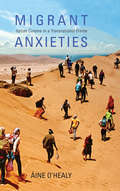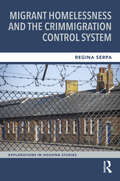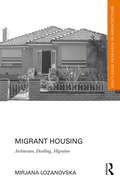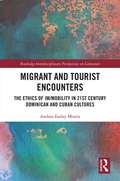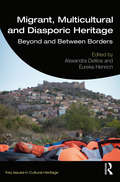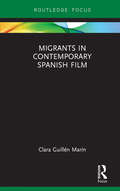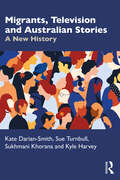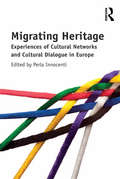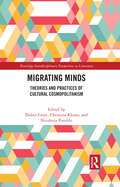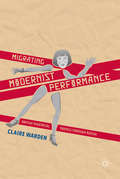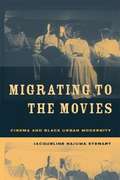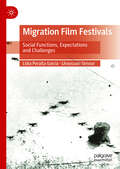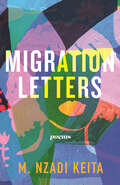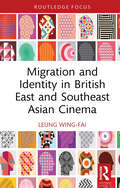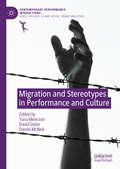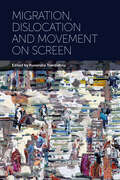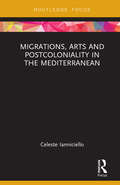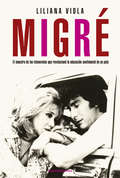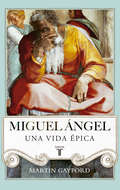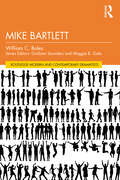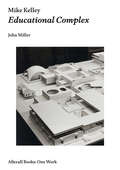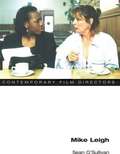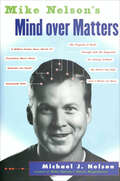- Table View
- List View
Migrant Anxieties: Italian Cinema in a Transnational Frame (New Directions in National Cinemas)
by Áine O'HealyDuring a period of heightened global concerns about the movement of immigrants and refugees across borders, Migrant Anxieties explores how filmmakers in Italy have probed the tensions accompanying the country’s shift from an emigrant nation to a destination point for over five million immigrants over the course of three decades. Áine O’Healy traces a phenomenology of anxiety that is not only present at the sociopolitical level but also interwoven into the narrative strategies of over 30 films produced since 1990, throwing into sharp relief the interface between the local and the global in this transnational era. Starting with the representation of post-communist migrations to Italy from Eastern Europe and subsequent arrivals from Africa through the controversial frontier of Lampedusa, O’Healy explores topics as diverse as the configuration of migrant labor, affective surrogacy, Italian whiteness, and the legacy of Italy’s colonial history. Showing how contemporary filmmaking practices in Italy are linked to changes in the broader media landscape, O’Healy analyzes the ways in which both Italian and migrant filmmakers are reimagining Italian society and remapping the nation’s borderscape.
Migrant Homelessness and the Crimmigration Control System (Explorations in Housing Studies)
by Regina SerpaMigrant Homelessness and the Crimmigration Control System offers new insights into the drivers of homelessness following migration by unpacking the housing consequences of ‘crimmigration’ control systems in the US and the UK. The book advances ‘housing sacrifice’ as a concept to understand journeys in and out of homelessness and the coping strategies migrants employ. Undergirded by persuasive empirical research, it offers a compelling case for a ‘social citizenship’ right to housing guaranteed across social, political and civil realms of society. The book is structured around the 30 life stories of people who have migrated to the capital cities of Boston and Edinburgh from Central America and Eastern Europe. The narratives are complemented by interviews with a range of stakeholders (including frontline caseworkers, activists and policymakers). Guided by the tenets of critical realist theory, this book offers a biographical inquiry into the intersections of race, class and gender and provides insight into the everyday precarity homeless migrants face, by listening to them directly. It will be of interest to students, scholars, and policymakers across a range of fields including housing, immigration, criminology, sociology, and human geography.
Migrant Homelessness and the Crimmigration Control System (ISSN)
by Regina SerpaMigrant Homelessness and the Crimmigration Control System offers new insights into the drivers of homelessness following migration by unpacking the housing consequences of ‘crimmigration’ control systems in the US and the UK. The book advances ‘housing sacrifice’ as a concept to understand journeys in and out of homelessness and the coping strategies migrants employ. Undergirded by persuasive empirical research, it offers a compelling case for a ‘social citizenship’ right to housing guaranteed across social, political and civil realms of society. The book is structured around the 30 life stories of people who have migrated to the capital cities of Boston and Edinburgh from Central America and Eastern Europe. The narratives are complemented by interviews with a range of stakeholders (including frontline caseworkers, activists and policymakers). Guided by the tenets of critical realist theory, this book offers a biographical inquiry into the intersections of race, class and gender and provides insight into the everyday precarity homeless migrants face, by listening to them directly. It will be of interest to students, scholars, and policymakers across a range of fields including housing, immigration, criminology, sociology, and human geography.
Migrant Housing: Architecture, Dwelling, Migration (Routledge Research in Architecture)
by Mirjana LozanovskaMigrant Housing, the latest book by author Mirjana Lozanovska, examines the house as the architectural construct in the processes of migration. Housing is pivotal to any migration story, with studies showing that migrant participation in the adaptation or building of houses provides symbolic materiality of belonging and the platform for agency and productivity in the broader context of the immigrant city. Migration also disrupts the cohesion of everyday dwelling and homeland integral to housing, and the book examines this displacement of dwelling and its effect on migrant housing. This timely volume investigates the poetic and political resonance between migration and architecture, challenging the idea of the ‘house’ as a singular theoretical construct. Divided into three parts, Histories and theories of post-war migrant housing, House/home and Mapping migrant spaces of home, it draws on data studies from Australia and Macedonia, with literature from Canada, Sweden and Germany, to uncover the effects of unprivileged post-war migration in the late twentieth century on the house as architectural and normative model, and from this perspective negotiates the disciplinary boundaries of architecture.
Migrant and Tourist Encounters: The Ethics of Im/mobility in 21st Century Dominican and Cuban Cultures (Routledge Interdisciplinary Perspectives on Literature)
by Andrea Easley MorrisMigrant and Tourist Encounters: The Ethics of Im/mobility in 21st Century Dominican and Cuban Cultures analyzes the effects of clashing flows of voluntary and involuntary travelers to and from these countries due to an increase in migration and tourism during the last three decades. I compare the ways in which literary works and films reflect on and critique the power relations and ethics of im/mobility and encounter, both on the islands and in destinations abroad. The works draw attention to the interconnectedness of migration, tourism, and other forms of travel as well as immobility, and portray growing local and global inequalities through characters’ disparate access to free, voluntary movement. I consider how the works respond to the question of the moral potential of encounters produced by im/mobilities and the possibility of connection across differences. I argue that Dominican and Cuban artists not only critique neo-colonial paradigms of power and im/mobility, but envision and enact strategies for belonging and, in some cases, suggest a path toward de-colonial cosmopolitanism.
Migrant, Multicultural and Diasporic Heritage: Beyond and Between Borders (Key Issues in Cultural Heritage)
by Eureka Henrich Alexandra DelliosMigrant, Multicultural and Diasporic Heritage explores the role heritage has played in representing, contesting and negotiating the history and politics of ethnic, migrant, multicultural, diasporic or ‘other’ heritages in, within, between and beyond nations and national boundaries. Containing contributions from academics and professionals working across a range of fields, this volume contends that, in the face of various global ‘crises’, the role of heritage is especially important: it is a stage for the negotiation of shifting identities and for the rewriting of traditions and historical narratives of belonging and becoming. As a whole, the book connects and further develops methodological and theoretical discourses that can fuel and inform practice and social outcomes. It also examines the unique opportunities, challenges and limitations that various actors encounter in their efforts to preserve, identify, assess, manage, interpret and promote heritage pertaining to the experience and history of migration and migrant groups. Bringing together diverse case studies of migration and migrants in cultural heritage practice, Migrant, Multicultural and Diasporic Heritage will be of great interest to academics and students engaged in the study of heritage and museums, as well as those working in the fields of memory studies, public history, anthropology, archaeology, tourism and cultural studies.
Migrants in Contemporary Spanish Film (Routledge Focus on Film Studies)
by Clara Guillén MarínDuring the last two decades Spain has undergone an unprecedented transformation from being a country of emigrants to receiving a significant number of migrants from all around the world. This book focuses on the analysis of documentaries and fiction films representing migrants in Spain in the first decade of the twenty-first century. Guillén Marín explores the ways in which migrant and non-migrant filmmakers reframe the urban and rural space to create opportunities for a free, although contested, exchange between marginal voices and mainstream Spanish society. She analyzes the extent to which the films challenge forms of exclusion and represent ethnicity in a space that includes some and excludes others.
Migrants, Television and Australian Stories: A New History
by Kyle Harvey Sue Turnbull Sukhmani Khorana Kate Darian-SmithThis book examines the intertwined histories of television and migration in Australia, told from the perspectives of migrants who worked in the screen industry and the many more who watched television. Their stories demonstrate how Australia’s growing cultural diversity has challenged conventional representations of ‘Australianness’ on television, and how ongoing advocacy has supported the growing inclusivity of multiple narratives and diverse experiences on screen.Migrants from many backgrounds were instrumental in the establishment in 1956 of Australian television, working behind and in front of the cameras as producers, directors, writers, technicians and actors. From early broadcasting to the digital present, portrayals of cultural differences have often been shaped by appropriation, ethnic stereotyping and racism. This has occurred across a range of formats from drama to comedy to news and reality shows. Many in the industry have responded with resilience and creative adaptation, as they have increasingly taken control of the ways that migrant stories are told and diversity is celebrated.The first comprehensive Australian study of migrants and television, this book considers the ways multicultural audiences have experienced the small screen over seven decades. Drawing on rich oral histories, it analyses the memories of television in the work, school, family life and leisure of migrant communities and their broader engagements with Australian culture. Research in the archives of broadcasters and production companies reveals how non-Anglo Australian characters were constructed, and how such portrayals have shifted. This new history takes us to digital screen production and consumption today, exploring how Australians of many diasporas engage with the global network of screen content in the twenty-first century. It is essential reading for media professionals, advocates, students and those interested in the intersections between media, cultural diversity and the nation.
Migrating Heritage: Experiences of Cultural Networks and Cultural Dialogue in Europe
by Perla InnocentiBringing together an international forum of experts, this book looks at how museums, libraries and further public cultural institutions respond to the effects of globalisation, mobility and migration across Europe. It puts forward examples of innovative practice and policies that reflect these challenges, looking at issues such as how cultural institutions present themselves to and interact with multicultural audiences, how to support networking across European institutions, and share practice in core activities such as archiving interpreting and exhibiting artefacts. Academics, practitioners from museums and public institutions and policymakers explore theoretical and practical approaches from a range of different disciplines such as museum and cultural heritage studies, cultural memory studies, social anthropology, sociology of organizations, cultural heritage management and cultural heritage informatics.
Migrating Minds: Theories and Practices of Cultural Cosmopolitanism (Routledge Interdisciplinary Perspectives on Literature)
by Didier CosteMigrating Minds contributes to the prominent interdisciplinary domain of Cosmopolitan Studies with twenty innovative essays by humanities scholars from all over the world that re-examine theories and practices of cosmopolitanism from a variety of perspectives. The volume satisfies the need for a stronger involvement of Comparative and World Literatures and Cultures, Translation, and Education Theories in this crucial debate, and also proposes an experimental way to explore in depth the necessity of a cosmopolitan method as well as the riches of cosmopolitan representations. The essays follow a logical progression from the situated philosophical and political foundations of the debate to interdisciplinary propositions for a pedagogy of cosmopolitanism through studies of modern and contemporary cosmopolitan cultural practices in literature and the arts and the concurrent analysis of prototypes of cosmopolitan identities. This trajectory allows readers to appreciate new historical, theoretical, aesthetic, and practical implications of cosmopolitanism that pertain to multiple genres and media, under different modes of production and reception. In the de-territorialized landscape of Migrating Minds, mental and sentimental mobility, rather than the legacy of place, is the key to an efficient, humanist response to deadening globalization.
Migrating Minds: Theories and Practices of Cultural Cosmopolitanism (Routledge Interdisciplinary Perspectives on Literature)
by Didier CosteAwarded the 2023 "René Wellek Prize for the Best Edited Essay Collection" by the American Comparative Literature Association, Migrating Minds contributes to the prominent interdisciplinary domain of Cosmopolitan Studies with 20 innovative essays by humanities scholars from all over the world that re-examine theories and practices of cosmopolitanism from a variety of perspectives. The volume satisfies the need for a stronger involvement of Comparative and World Literatures and Cultures, Translation, and Education Theories in this crucial debate, and also proposes an experimental way to explore in depth the necessity of a cosmopolitan method as well as the riches of cosmopolitan representations.The essays follow a logical progression from the situated philosophical and political foundations of the debate to interdisciplinary propositions for a pedagogy of cosmopolitanism through studies of modern and contemporary cosmopolitan cultural practices in literature and the arts and the concurrent analysis of prototypes of cosmopolitan identities. This trajectory allows readers to appreciate new historical, theoretical, aesthetic, and practical implications of cosmopolitanism that pertain to multiple genres and media, under different modes of production and reception. In the deterritorialized landscape of Migrating Minds, mental and sentimental mobility, rather than the legacy of place, is the key to an efficient, humanist response to deadening globalization.
Migrating Modernist Performance
by Claire WardenExploring the experiences of early to mid-twentieth century British theatre-makers in Russia, this book imagines how these travellers interpreted Russian realism, symbolism, constructivism, agitprop, pageantry, dance or cinema. With some searching for an alternative to the corporate West End, some for experimental techniques and others still for methods that might politically inspire their audiences, did these journeys make any differences to their practice? And how did distinctly Russian techniques affect British theatre history? Migrating Modernist Performance seeks to answer these questions, reimagining the experiences and creative output of a range of, often under-researched, practitioners. What emerges is a dynamic collection of performances that bridge geographical, aesthetic, chronological and political divides.
Migrating to the Movies: Cinema and Black Urban Modernity
by Jacqueline Najuma StewartThe first comprehensive book on African Americans and early cinema, which takes Chicago and the Great Migration as its primary case study.
Migration Film Festivals: Social Functions, Expectations and Challenges (Framing Film Festivals)
by Lidia Peralta García Lhoussain SimourThis book explores the intersections of migration and film festivals, with particular attention to their social functions . Adopting an interdisciplinary and multi-bottom line perspective, the authors address the purposes and circumstances of migration film festivals; their delimitation as distinct from other genres of festivals; their cinematographic creation; and their approaches to the curation and programming of films. Numerous questions arise in the process: Is social function prone to homogenization among migration film festivals? What are these festivals’ main constraints in negotiating their social functions? What is their actual capacity to foster social transformation? How do we conceive of the fact that most migration festival goers are rarely the ones in need of changing their perceptions? How are migrants actually involved in these cultural events? What are the specific challenges that undermine migration film festivals in achieving a greater social impact, and in turning into true axes of critical reflection towards more empathetic, inclusive and respectful ways of life?
Migration Letters: Poems (Raised Voices #5)
by M. Nzadi KeitaA poetry collection that reflects on intimate aspects of Black history, culture, and identity, revealing an uncommon gaze on working-class Philadelphia from the 1960s to the present dayIn 55 poems, Migration Letters straddles the personal and public with particular, photorealistic detail to identify what, over time, creating a home creates in ourselves. Drawn from her experiences of being born in Philadelphia into a Black family and a Black culture transported from the American South by the Great Migration, M. Nzadi Keita&’s poetry sparks a profoundly hybrid gaze of the visual and the sensory. Her lyrical fragments and sustained narrative plunge into the unsung aspects of Black culture and explore how Black Americans journey toward joy.Propelled by the conditions that motivated her family&’s migration north, the poems pull heavily from Keita&’s place in her family, communities, and the world at large. They testify to her time and circumstances growing up Black in Philadelphia on the periphery of the civil rights and Black Power movements. Each poem builds upon an inheritance of voices: a panoramic perspective of an Easter Sunday service in a Black church gives way to an account of psychic violence in a newly integrated school; the collective voices of a beauty salon&’s patrons fragment into memories of neighborhoods in North Philadelphia that have faded over time.Migration Letters strives to tell a story about Black people that radiates across generations and testifies to a world that, as Lucille Clifton wrote, &“has tried to kill [us] and has failed.&” They interrogate how one&’s present begins in the past, what we gain from barriers and boundaries, and what notions of progress energize our journey forward. Keita&’s poems intimately reveal how Black culture can be inherited and built upon complex relationships where love and pain are inextricably linked.
Migration and Identity in British East and Southeast Asian Cinema (Routledge Focus on Film Studies)
by Wing-Fai LeungAn emerging interest in a British East and Southeast Asian identity after decades of political and social exclusion has coincided with periods of economic and political challenges in the UK. In Migration and Identity in British East and Southeast Asian Cinema, Leung Wing-Fai argues that this explosive context has created rich and diverse forms of storytelling and an accented cinematic language. By offering close readings of key contemporary films and positioning them in a wider slate of releases by British East and Southeast Asian filmmakers alongside Anglophone film histories in the Global North, this book sheds light on a developing field and engenders new ways of understanding British cinema and society. The author explores changing representational politics in contemporary cinema and argues for the cinematic visibility of a hitherto silenced community. Drawing on theoretical frames from sociological, film and cultural studies to critically engage with the textual and visual language of the case studies, Leung claims the place of British East and Southeast Asian Cinema as a film and cultural movement. Highlighting diversity among the British East and Southeast Asian community, pushing boundaries in its intersectional approach to ethnicity, race, gender and sexuality, and proposing a critical framework for academic studies on diasporic film-making in the UK, this nuanced and innovative study will interest researchers, teachers and students in a range of Humanities and Liberal Arts subjects, including Film and Media Studies, Regional/Area Studies (Asia), and arts, cultural and creative productions from the East and Southeast Asian diaspora.
Migration and Stereotypes in Performance and Culture (Contemporary Performance InterActions)
by David Dean Yana Meerzon Daniel McNeilThis book is an interdisciplinary collection of essays that delves beneath the media headlines about the “migration crisis”, Brexit, Trump and similar events and spectacles that have been linked to the intensification and proliferation of stereotypes about migrants since 2015. Topics include the representations of migration and stereotypes in citizenship ceremonies and culinary traditions, law and literature, and public history and performance. Bringing together academics in the arts, humanities and social sciences, as well as artists and theatre practitioners, the collection equips readers with new methodologies, keywords and collaborative research tools to support critical inquiry and public-facing research in fields such as Theatre and Performance Studies, Cultural and Migration Studies, and Applied Theatre and History.
Migration, Dislocation and Movement on Screen
by Ruxandra TrandafoiuContemporary screen industries such as film and television have become primary sites for visualizing borders, migration, maps, and travel as processes of separation and dislocation, but also connection. Migration, Dislocation and Movement on Screen pulls case studies in film and television industries from throughout Europe, North Africa, and Asia to interrogate the nature of movement via moving images. By combining theoretical, interdisciplinary engagements with empirical research, this volume offers a new way to look at screen media's representations of our contemporary world's transnational and cosmopolitan imaginaries.
Migrations, Arts and Postcoloniality in the Mediterranean (Routledge Focus on Art History and Visual Studies)
by Celeste IannicielloThis book is focused on the transcultural memory of the Mediterranean region and the different ways it is articulated by contemporary art practices and museum projects linked to migrations, exile, diaspora and transnationality. The artistic and curatorial examples analysed in this study articulate a critical relationship between the cultural representations and the sense of heritage, property and belonging, offering the opportunity of a more problematic and stimulating vision of the preservation of the European arts, traditions and histories. Artists and projects examined include the project Porto M in Lampedusa, Zineb Sedira, Ursula Biemann, Lara Baladi, Mona Hatoum, Emily Jacir, Kader Attia and Walid Raad.
Migré: El maestro de las telenovelas que revolucionó la educación sentimental de un país
by Liliana ViolaBiografía del creador de telenovelas célebres como Rolando Rivas, taxista, Piel naranja, Pobre diabla y Una voz en el teléfono, que moldearon la historia sentimental de generaciones de argentinos. Lo llamaron "el señor éxito", "el padre de la lágrima" y "el autor del amor". Escribió más de 700 títulos sin más colaboradores que su máquina Remington. Sus telenovelas fueron una verdadera factoría de galanes, parejas románticas y canciones inolvidables. Durante cuatro décadas tuvo en sus manos las emociones domésticas de las tardes y las noches. Con Rolando Rivas taxista, la ficción más recordada de la televisión argentina, conquistó al público masculino y marcó un nuevo estándar en el modo de producir y mirar tv. Se atrevió a plantear un final infeliz en Piel Naranja en vísperas de la dictadura de 1976 e impuso una palabra guaraní -"rojaiju"- en el lenguaje amoroso de los años 70'. Ultimo representante de la telenovela de autor, Alberto Migré sentó las bases de una industria de los sentimientos que se volvió global. En este libro apasionante Liliana Viola construye una biografía a la medida de su personaje donde cada secreto revelado abre las puertas de un secreto mayor. Actores y actrices, directores, admiradores y amigos íntimos aportan testimonios desopilantes y conmovedores para el retrato del hombre que patentó un modo de amar alternativo a la vida real y supo denunciar como ninguno la influencia nefasta del machismo en las relaciones humanas y el factor melodrama en los rencores que signan la política argentina.
Miguel Ángel: Una vida épica
by Martin GayfordLa biografía definitiva de Miguel ÁngelA los treinta y un años ya se le consideraba el mejor artista de Italia, y probablemente del mundo; pero para sus enemigos Miguel Ángel era arrogante, zafio y extravagante. Durante décadas, se movió en el centro de la vorágine en la que la historia de Europa se vio sumida durante el paso del Renacimiento a la Contrarreforma.Como un héroe de la mitología clásica #similar al Hércules que esculpió en su juventud#, fue sometido a constantes pruebas. Esta biografía, fruto de una investigación minuciosa y capaz de englobarlo todo #desde las cartas de la época y aquellas primeras biografías repletas de chismes, hasta las últimas investigaciones acerca de Miguel Ángel# tiene también, en sí misma, algo de epopeya.Para Martin Gayford , el mayor logro de Miguel Ángel no estriba tanto en sus mejores obras como en su inmensa personalidad, que transformó para siempre nuestra noción de lo que puede llegar a ser un artista. La crítica ha dicho...«Una muestra de la magnitud del personaje, y de la habilidad de Gayford a la hora de captarla, es que uno termina este libro deseando que Miguel Ángel hubiera vivido más tiempo y creado más.»Financial Times «Un libro cautivador, increíblemente bien contado y con un gran escritor al mando de un inmenso cuerpo de investigación.» Mail on Sunday«Sólo el más ambicioso biógrafo puede aceptar el desafío de reflejar el talento de Miguel Ángel Buonarroti.»The Times«Gayford capta el acto sutil y efímero de la creación artística con una habilidad y sensibilidad que pocos escritores poseen.»The Guardian«Una biografía perspicaz y finamente matizada, cuya lectura es tan irresistible como la de los anteriores libros de Gayford. A pesar de su tamaño, la obra es maravillosamente sintética y se precipita con elegancia a través de décadas repletas de acción que vieron a Miguel Ángel ir y venir de Florencia a Roma, pasando por las canteras de mármol de Carrara.»The Spectator«Es muy difícil abrirse paso en la espesura de años de estudios y decir algo nuevo sobre David, la Capilla Sixtina, El Juicio Final o muchas otras obras maestras de Miguel Ángel, pero Martin Gayford lo consigue, y nos invita a pensar y ver más allá de lo obvio.»Sunday Telegraph
Mike Bartlett (Routledge Modern and Contemporary Dramatists)
by William C. BolesHailed as one of the most talented playwrights to have emerged in the late 2000s, Mike Bartlett's diverse range of plays strike at the heart of the various crises predominant in the early twenty-first century. Offering the first extensive examination of the plays and television series written by award winning playwright Mike Bartlett, this volume not only provides analysis of some of Bartlett’s best-known works (Cock, Doctor Foster, King Charles III, and Albion), but also includes new interviews with Bartlett and some of his closest and oft relied upon collaborators. In this book, Bartlett’s plays and television series are grouped together thematically, allowing the reader to observe the cross-pollination between his works on the stage and screen. The book also includes an introductory biographical chapter that discusses early influences on his writing (Harold Pinter, Mark Ravenhill, Tony Kushner, and Quentin Tarantino), his time in the Young Writers Programme at the Royal Court, and his work with the Apathists.Routledge Modern and Contemporary Dramatists is a series of innovative and exciting critical introductions to the work of internationally pioneering playwrights, giving undergraduate students an ideal point of entry into these key figures in modern drama.
Mike Kelley: Educational Complex (One Work)
by John MillerAn illustrated examination of a 1995 work by Mike Kelley that marked a significant change in his work. One of the most influential artists of our time, Mike Kelley (1954–2012) produced a body of innovative work mining American popular culture as well as modernist and postmodernist art—relentless examinations of subjectivity and of society that are both sinister and ecstatic. With a wide range of media, Kelley's work explores themes as varied as post-punk politics, religious systems, social class, and repressed memory. Using architectural models to represent schools he attended, his 1995 work, Educational Complex, presents forgotten spaces as frames for private trauma, real or imagined. The work's implications are at once miniature and massive. In this book, John Miller offers an illustrated examination of this milestone work that marked a significant change in Kelley's practice. A “complex” can mean an architectural configuration, a psychological syndrome, or a political apparatus, and Miller approaches Educational Complex through corresponding lines of inquiry, considering the making of the work, examining it in terms of education and trauma (sexual or otherwise), and investigating how it tests the ideological horizon of art as an institution. Miller shows that in Educational Complex, Kelley expands his political and aesthetic focus, including not only such artifacts as generic forms of architecture but (inspired by the infamous McMartin Preschool case) popular fantasies associated with ritual sex abuse and false memory syndrome. Through this archaeology of the contemporary, Miller argues, Kelley examines the mandate for education and the liberal democratic premises underpinning it.
Mike Leigh (Contemporary Film Directors)
by Sean O'SullivanIn this much needed examination of Mike Leigh, Sean O'Sullivan reclaims the British director as a practicing theorist--a filmmaker deeply invested in cinema's formal, conceptual, and narrative dimensions. In contrast with Leigh's prevailing reputation as a straightforward crafter of social realist movies, O'Sullivan illuminates the visual tropes and storytelling investigations that position Leigh as an experimental filmmaker who uses the art and artifice of cinema to frame tales of the everyday and the extraordinary alike. O'Sullivan challenges the prevailing characterizations of Leigh's cinema by detailing the complicated constructions of his realism, positing his films not as transparent records of life but as aesthetic transformations of it. Concentrating on the most recent two decades of Leigh's career, the study examines how Naked, Secrets and Lies, Topsy-Turvy, Vera Drake, and other films engage narrative convergence and narrative diffusion, the tension between character and plot, the interplay of coincidence and design, cinema's relationship to other systems of representation, and the filmic rendering of the human figure. The book also spotlights such earlier, less-discussed works as Four Days in July and The Short and Curlies, illustrating the recurring visual and storytelling concerns of Leigh's cinema. With a detailed filmography, this volume also includes key selections from O'Sullivan's several interviews with Leigh.
Mike Nelson's Mind Over Matters
by Michael J. NelsonWhy do some people retain cute baby-talk names for their relatives (like "Num-Num" and "Pee-Paw") well into middle age? How should a reasonable person respond when Olivia Newton-John sings, "Have you never been mellow?" Who's responsible for the sorry state of men's fashion, and is it the same guy who invented the jerkin? Is there any future in being a Midwesterner? Can you really enjoy your lunch when the restaurant is decorated to look like an African plain? How come women keep dozens of bottles and jars of moisturizers, unguents, and lotions around -- all of them half empty? In more than 50 hilarious all-new essays, one of America's brightest young humorists -- the head writer and on-air host of the legendary TV series Mystery Science Theater 3000 -- finds the fun in all aspects of the human condition, no matter how absurd. Join Mike Nelson on an angst-filled visit to a health spa; shopping sessions at Home Depot and Radio Shack; adventures in the very amateur musical theater; a gut-busting discourse on the history of television; ruminations on his roles as husband, father, and citizen; and much, much more.
